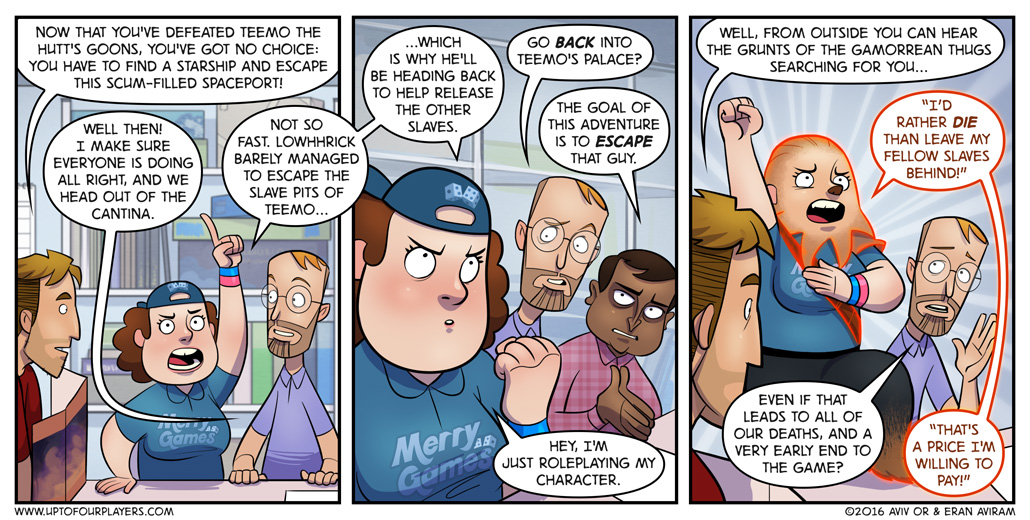Emily sees herself as a True Gamer. When playing board games, she goes all the way: in Carcassonne, she ignores all aesthetic considerations, and aims to maximise points at all costs; in Power Grid she keeps a calculator nearby in order to make sure to buy the power stations that best utilize the fuel market as predicted for the next 4 rounds.
In roleplaying games, she figures, the True Gamer must BE their character before everything else. The point of the game is to get into character, right?
She is wrong, and that’s not the point.
It’s a feature of roleplaying games that they allow you to embody a fictional character, but it’s not, necessarily, the only goal. Unlike board games, that have clear win conditions, the win conditions of roleplaying games are somewhat hazy, and usually, most of them remain a part of a non-verbal agreement between all participants. “We should all have fun” is one such condition. But also, “We should all remain within the tropes of the genre we agreed upon”, and “We should all be able to use the system at the same level of expertise, more or less” and also, and this is the big one here, “We should all go along with the story style we agreed upon.” Character-based, improvised storyline? Sure, as long as we all agree this is what we we’re here to do.
In this case, we have a ready-made boxed set with a pre-made adventure, that provide some very obvious hooks toward the expected rest of the plot (Edge of the Empire Beginner Game, it’s very good). Going against these expectations is, simply put, being a bad player. But, in a way, not making these expectations clear, is sort of being a bad GM. Especially since this is his first time playing with all of these guys, Nadav should have talked with everyone before the game, to make sure everyone knows what this game is about, and what sort of experience he’s expecting them to go through.
People have different styles, histories and motivations, and therefore, always coordinate your expectations.
Here’s a bit more about player motivations – why do you, the player, join the game at all? What’s fun for you? There are many different answers. The good gamer learns to recognize what they want, communicate that to the other players, and find a common ground with them. Avner Shahar-Kashtan expanded this list on his blog (Hebrew), and we later brought him to talk about it in an episode of our Israeli RPG podcast (Hebrew).
(A word about Railroading: I tend not to use this word because it’s sometimes used to indicate a GM that doesn’t grant “enough freedom” within the confines of his expected plot, but sometimes it simply means “having an expected plot” at all; some players refuse to accept any kind of pre-made plot, and call that “railroading”. As already noted before, I find that there’s nothing inherently wrong with pre-made plots, the only problem is not coordinating your expectations before the game.)
Read this story arc from the beginning: Gathering the Party




